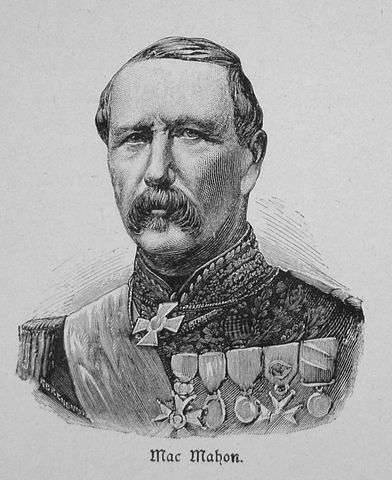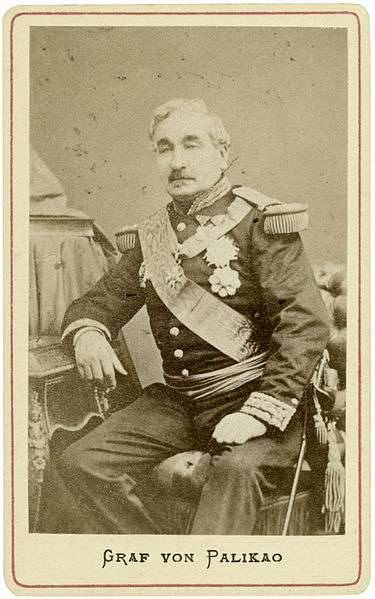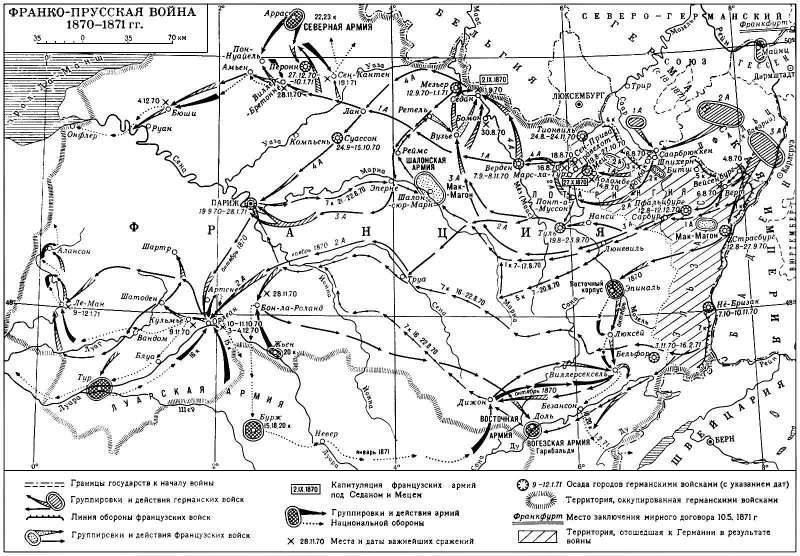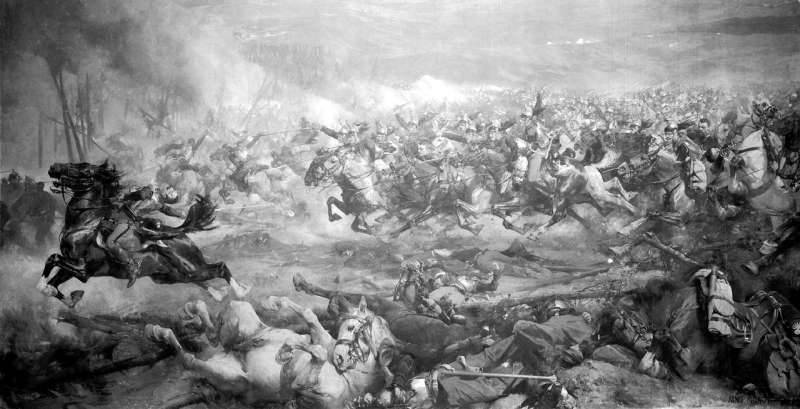The First Defeats of the Second Empire: the Battle of Weisenburg, Werth, and on the Shpichhern Heights
From the very first days of the war, the superiority of the Prussian army over the French was revealed. The Prussians, faster than the French, mobilized the army and concentrated it on the border. They secured an almost double numerical superiority over the French army. In such a situation, the courage and courage of the French soldiers could not save the situation at the front. In addition, the French command made a number of serious mistakes and lost the ability to rectify the situation by the skillful actions of their troops. As a result, French troops began to suffer one defeat after another.
4 August 1870 The 3 Army, consisting of 5, 11 Prussian and 2 Bavarian corps under the general command of crown prince Friedrich of Prussia, attacked the Weißenburg line in Alsace. On this sector of the front, there was only one French division - the 2-division of the 1 army corps. Her commander, General Abel Due, did not expect an enemy attack. By his order, reconnaissance of the area adjacent to the location of the French troops was made, and reconnaissance did not find anything. Therefore, the attack of the enemy was sudden for the French. The Germans, on the contrary, had complete information about the enemy, because even before the war they had organized a good spy ring in France and had a complete picture of the French army, its condition and location. Thus, at the very beginning of the war, one of the main shortcomings of the French army was evident - the poor organization of its intelligence.
It is clear that one French division (about 5-6 thousand people), which did not even suspect the proximity of the enemy and was guarded by several patrols, could not withstand the whole army. General Duee, due to the disunity of the French troops, could not count on timely reinforcement in the event of heroic resistance. However, the French, contrary to the expectations of the enemy, put up stubborn resistance. This is recognized and Moltke. “It’s early in the morning,” Moltke reported, “the Bavarians on the right wing stumbled upon vigorous resistance under the walls of Weißenburg ... The heavily fortified castle of Weißenburg offered the strongest resistance. In vain with the greatest sacrifices, the grenadiers of the 7 Royal Regiment stormed this castle; the garrison surrendered only when, with extraordinary efforts, it was possible to raise artillery to a height. The French division attracted three German corps and, after stubborn resistance, albeit with great losses and in disorder, made a retreat. The Germans suffered relatively large losses - an 91 officer and an 1460 soldier. ”
The French held back the enemy with rifle volleys and bayonet attacks. Only thanks to numerical superiority and the introduction of artillery into battle, having concentrated 25 thousand soldiers, did the German troops overthrow the French. The remnants of the division retreated, losing the battalion, blocked in Weysenburg. In battle, killed the commander of the division Douai. After the fall of Weissenburg to the German army, the road was opened for further advance into the interior of France.
The Weissenburg (Wissemburg) battle was the first serious clash of two armies. True, the French had captured the German city of Saarbrücken in two divisions. But his garrison consisted of only one battalion and three squadrons, so this operation was not of serious importance and was undertaken by the French command in order to create the appearance of a decisive offensive and reassure public opinion.
When 5 August news of the defeat suffered on the eve of the French army at Weisenburg, penetrated to Paris from British and German sources, the capital became very excited, as French society expected news of victories. 6 August Paris spread a provocative rumor about a major victory won by the troops of the 1 Corps under the command of MacMahon, about thousands of captured Germans, including the allegedly Crown Prince of Prussia, commander of the 3 Army. This rumor was apparently started, not without the knowledge of the government, by the stock market speculators of Paris, who scored a big sum. By the end of the day 6 of August, it became known that the rumor of victory was a hoax and that it was deliberately spread by Parisian stockbrokers. This caused the indignation of citizens and unrest, some speculators beat up.
At the same time, a false rumor about victory was launched on August 6 also in Alsace, in Lorraine, in Champagne, in a number of large cities in France, in particular in Lyon. Only around midnight did a message arrive in Paris from Metz from Napoleon III about the withdrawal of the French army. It announced the need to declare Paris a state of siege and prepare for the defense of the capital. On the morning of August 7, new dispatches arrived that reported the defeats suffered by the French army at Wörth and Forbach on 6 August. The authorities were forced to report them to the public.
Battles of Wirth and Spichern
Indeed, the situation at the front was difficult. The French command, after the defeat at Weisenburg, threw in two corps under the command of MacMagon (MacMagan troops were stationed in the Strasbourg area). However, while MacMahon was pushing his forces, German troops attacked the French army near Wörth, fifteen miles south-west of Weißenburg. The battle took place 6 August 1870. The troops of Crown Prince Frederick had a significant numerical advantage: 75 thousand infantry, 6 thousand cavalry and 300 guns against 32 thousand infantry, 4,8 thousand cavalry with 100 guns from the French.
The battle was fierce and bloody in nature. The French occupied positions advantageous for defense on the other side of the river Sauer, and had the opportunity to use artillery and long-range rifles against the Germans. At 7 hours of the morning, the Prussians ford crossed the river under a hurricane of French guns. Germans crossed the river on the chest in the water, showered with a hail of bullets. Frontal attack almost ended in defeat for them. In the battle of Wörth, as in the battle of Weißenburg, the French soldiers showed courage and resilience. For many hours, they successfully repelled the attacks of the enemy and held their positions.
German troops suffered heavy losses. Only by 10 in the morning did the Prussians be able to push the artillery, which supported the infantry attacks. The Germans were saved by the fact that by imposing the main battle on the enemy in the center, they simultaneously began to push the weak flanks of the French. Only the support of the flank and artillery could finally break the resistance of the French troops. In addition, the French troops did not wait for the promised assistance, and the German units received reinforcements in a timely manner. The expected arrival of General de Faye's 5 Corps did not take place, as his troops were still on the way. French prowess was not enough to prevent defeat. The desperate attack of the French cavalry could not rectify the situation. Cuirassiers attacked the 32 th regiment with a solid mass, but they were soon defeated and retreated. Counterattacks in the southern sector of the battle also did not save the French army.
Thus, MacMahon was knocked out of his position before he was able to fully gather his fighting forces. MacMahon's troops were driven south, from where they began to move towards Nancy. The French lost 14 thousand people of them - 6 thousand prisoners. Prussian losses, due to frontal attacks and the impact of French artillery and long-range rifles, were also serious - 10,6 thousand people.
On the same day, the French commander of the 2 Corps of the French Army, Charles Frossard, gave the Prussians a battle at Spihern near Forbach. The French had about 30 thousand soldiers with 90 guns (three divisions of the 2 corps and one regiment of the 3 corps under the command of Marshal Bazin). The commander of the 1 Army, Karl Friedrich von Steinmetz, threw 45 thousand soldiers into battle with 108 guns.
The French occupied comfortable heights and prepared to repel Prussian attacks. The Prussian command, throughout the day, intensified the onslaught, bringing in more and more new soldiers. Frossar several times asked Commander-in-Chief Bazin to send reinforcements, but Bazin decided that the battle was still lost and, fearing the encirclement of his own army, did not send help. At the same time, on the left flank of Frossar seven infantry divisions were inactive, and in the rear - two guards divisions. Prussian artillery quickly suppressed short-french guns. At about 16 hours, Prussian troops, having suffered serious losses, seized approaches to the heights where the main French forces were stationed. Frossar threw his troops into a counterattack. A fierce battle ensued, turning into hand-to-hand combat. However, in the late afternoon, without waiting for reinforcements, Frossard was forced to leave fortified positions. Separate skirmishes continued until the morning of August 7.
Thus, this battle was also won by the Germans mainly due to the large numerical superiority and mistakes of the French command, which could not make full use of the fortified positions and available forces. The French soldiers bravely restrained the onslaught of the enemy, but they did not wait for help and were forced to retreat inland, to Metz. 2 th Corps Frossara lost more than 4 thousand people, Prussian losses, according to various sources - from 3 to 5 thousand people.
The defeat suffered by General Frossard at Forbach had dire consequences for the French army. “The French army,” wrote Lieutenant Colonel Rousset, “was forced to evacuate the Saar line and leave to the enemy all the territory extending all the way to the Moselle, Thionville and Metz fortresses. As for the Vosges barrier, it was completely lost for us ... The last hopes for the offensive finally disappeared. From now on, it was necessary to think only about opposing the successes of the enemy, whom his luck had made him even more enterprising, and who found himself in extremely favorable conditions thanks to the abundant accumulation of provisions between the Moselle and the border; our soldiers never took advantage of this food. ”
The first results were deplorable for the French army. The strategic initiative was finally lost. As a result of the three defeats suffered by the French army 4-6 of August, a significant part of the Rhine army was defeated and retreated inland. Border fortified positions were lost. German troops occupied part of Alsace and Lorraine. The French army and society, set up to win in the prewar period, were discouraged.

Marshal Patrice de MacMagon
"Breath of revolution"
The news of the defeat of MacMahon and Frossard caused spontaneous unrest in Paris. The authorities were at a loss. The city was shaken by numerous demonstrations. The townspeople demanded weaponsthe overthrow of Bonaparte and the establishment of the republic. True, the police and gendarmes still maintain order and dispersed them. Pro-government circles were despondent. Many understood that the collapse of the Second Empire was coming. Liberal journalist Louis Halevy 7 August wrote: “If a miracle does not happen, we died. All this is like the French Sadov ... That's the end of the empire! ”
Foreign diplomats in Paris also rated the plight of Napoleon III’s empire as deplorable. The British ambassador, Lord Lyons, told 6 August in London: "The dynasty is approaching its decline every day." He also said that he was afraid of the revolution. Unrest swept a number of cities in France. People expressed their dissatisfaction with the authorities and demanded the establishment of a republic in Lyon, Marseille, Toulouse, anti-government protests took place in many departments. The August municipal elections brought major success to the opposition parties of the Second Empire - Republicans, Socialists and Orleanists.
Marshal Canrober, who arrived at the Shalonsky camp for a military review of the mobile guard (the mobile guard battalions were formed from workers and representatives of the petty bourgeoisie) were met with stones. A military court sentenced some of the participants in the Shalon unrest to the death penalty. It became clear that the National Guard is unreliable.
The government, having recovered from the first shock, has taken a series of emergency measures. 7 August Paris announced a state of siege. At the head of the Paris garrison was an ardent Bonapartist Marshal Barage d'Ille. Thousands of soldiers of the marines (planned to use them for landing operations on the German coast) were called up from Cherbourg 10 from the capital and troops from some border departments were transferred to the capital. Part of the troops that had previously been at the front were also transferred to the capital. Simultaneously, 7 and 8 of August were published three appeals to the population of Paris and the province. The government called in them all “good citizens” to revive the traditions of 1792 and “unite in one party, the party of France, to stand under one banner, the banner of national honor”. It urged the people to "maintain order, for to violate it is to be in conspiracy with enemies." It was noted that participation in the unrest is tantamount to fighting against the French army and helping the enemy. Republicans were declared the enemies of the fatherland, the spies of Prussia. 9 August convened an extraordinary session of the Legislative Corps.
August 9 opened the Legislative Corps meeting. It took place in a tense atmosphere. The streets adjacent to the ward were filled with government troops and police. Thousands of citizens came to the Concorde Square and the nearest streets. They were excited and many spoke out against the government, demanding weapons to protect the capital. Empress Eugenia, who was appointed Regent for the time Napoleon III was in the army (she was extremely unpopular with the people), was in a panic and telegraphed to the emperor: “You have no idea ... Great difficulties ... I don’t have a military commander to meet events: the mutiny is almost raging in the streets ... In 48 hours I will be betrayed - alone under the influence of fear, others owing to thoughtlessness ”.
The meeting of the Legislative Chamber ended favorably for the government, the radical proposals of some deputies were rejected. In particular, the proposal was rejected immediately to remove Napoleon III from command of the army and from government, and to transfer executive authority to the committee from 15 members of the Legislative Corps. A proposal was adopted on arming the National Guard of France. There was a change of government: the ministry of Olivier resigned, to create a new cabinet was assigned to Count de Palicão.
"Ministry of National Defense"
On August 10, during the session of the Legislative Corps, the composition of the new government was announced. General Cousin-Montauban, Comte de Palicao, an ardent Bonapartist known for his looting and barbaric actions in China (Second Opium War) was appointed its head and minister of war. Before the war with Prussia, he commanded the 4 Corps, located in Lyon. At the new post, Cousin-Montaban stayed just 24 of the day.
The government has developed vigorous activities to mobilize the military resources of the nation. However, the troops strapped to Paris, about 40 thousand soldiers, remained in the capital. The state of siege increasingly spread throughout France. At the same time, cities that had no fortifications were declared under siege. According to the public, this was due to the fear of the government over the possibility of revolution in the country. The government “tightened the screws”, arrests of politically active citizens continued, republican newspapers were closed, military courts worked.
Despite the state of siege, France did not stop unrest, which severely crushed the authorities. The English, Russian, Swiss, and Belgian press reported riots in Lyon, Marseille, Toulouse, Limoges, and Bordeaux. On the night of August 12, Blanqui secretly arrived from Brussels in Paris, summoned by his supporters. The events of 9 August led the Blanquists to the conviction that Napoleon III could be overthrown that day. For this, only a revolutionary asset was needed, which would be led by the masses who were near the Legislative Corps. The Blanquists decided that there is still an opportunity to cause a general uprising in the capital if a revolutionary nucleus is organized, which will come forward and call the people for revolution.
The Blanquists acquired 300 revolvers and 400 daggers, hoping to seize weapons at the Bois de Vincennes, to distribute them to the people and throw all their forces at the storming of government buildings. Then, Blanca changed the plan: the garrison of the Castle of Vincennes was strengthened and it was impossible to take it with available forces; decided to seize the barracks of firefighters, located in close proximity to the working districts of La Villette and Belleville. 14 August, a small revolutionary squad (about 100 people) tried to occupy the barracks. But the sentries were on their guard and the plan of sudden seizure failed. Blanqui tried to convince the soldiers to join them. But the firefighters did not respond. In addition, soon the police arrived to help them. The Blanquists fought off a police attack, but a second attempt to persuade the firefighters to their side did not lead to success. The population also remained passive and did not support the Blanquists. It became obvious that the plan of the uprising failed. Blanqui rolled up the operation and dismissed the people.
He later admitted his mistake: “The rebels operating in La Villette,” wrote the 17 Forms in September of 1870 in September, “can be rightly blamed for being a week late. The empire had to collapse on Sunday 7 of August, the day after the defeat at Reichshofen, which brought Paris to its feet. ” 14 August, according to Blanqui, “was too late”, which the leaders of the uprising did not take into account. They mistakenly believed "that the seriousness of the situation and the preceding troubling days will serve as a sufficient motive for the population to join the rebels." However, the situation was already different: “In place of the recently experienced unrest,” wrote Blanqui, “the population had some kind of despondency and decay of energy. Thoughts took a different direction. People became suspicious, they had an exaggerated fear of Prussian spies. ”
The government immediately transferred the “La Villette case” to the military tribunal and increased terror. The pro-government press wrote that the “attempted assassination” of August 14 was the work of Prussian spies. Cousin-Montaban stated in the Legislative Corps: “We direct all our efforts against external and internal enemy. We will not stop the struggle until the fatherland is delivered from the external enemy and we do not weaken the internal enemy. You can count on unshakable hardness on my part. In my hands there are all the necessary means to quell any unrest that may occur, and I am responsible to the Chamber for the tranquility of Paris. ”
In Paris, the tacitly-operated system “no more than three” operated. Terror was rampant in the provinces too. Republicans were handed over as "Prussian spies." A “witch hunt” began when the authorities set the urban and rural population against republicans and socialists, calling them “spies”, “traitors” and “Prussians”. In villages and small towns, it came to mob justice when a confused population of government propaganda dealt with “internal enemies”.
Meanwhile, the French army was on the verge of disaster. The 16 and 18 August battles of Mars-la-Tour and Saint-Privat - Gravelotte took place. French troops were defeated. The French, frightened of losing contact with Metz, began to retreat to him, and were blocked there by the numerically superior Prussian army.

General Charles Cousin-Montaban
To be continued ...
- Alexander Samsonov
- The collapse of the Second Empire
145 years of the Paris Commune
Second empire on the road to disaster
The second empire on the road to disaster. Part of 2
The second empire on the road to disaster. H. 3
The beginning of the Franco-Prussian war. Plans and the state of the French army


Information